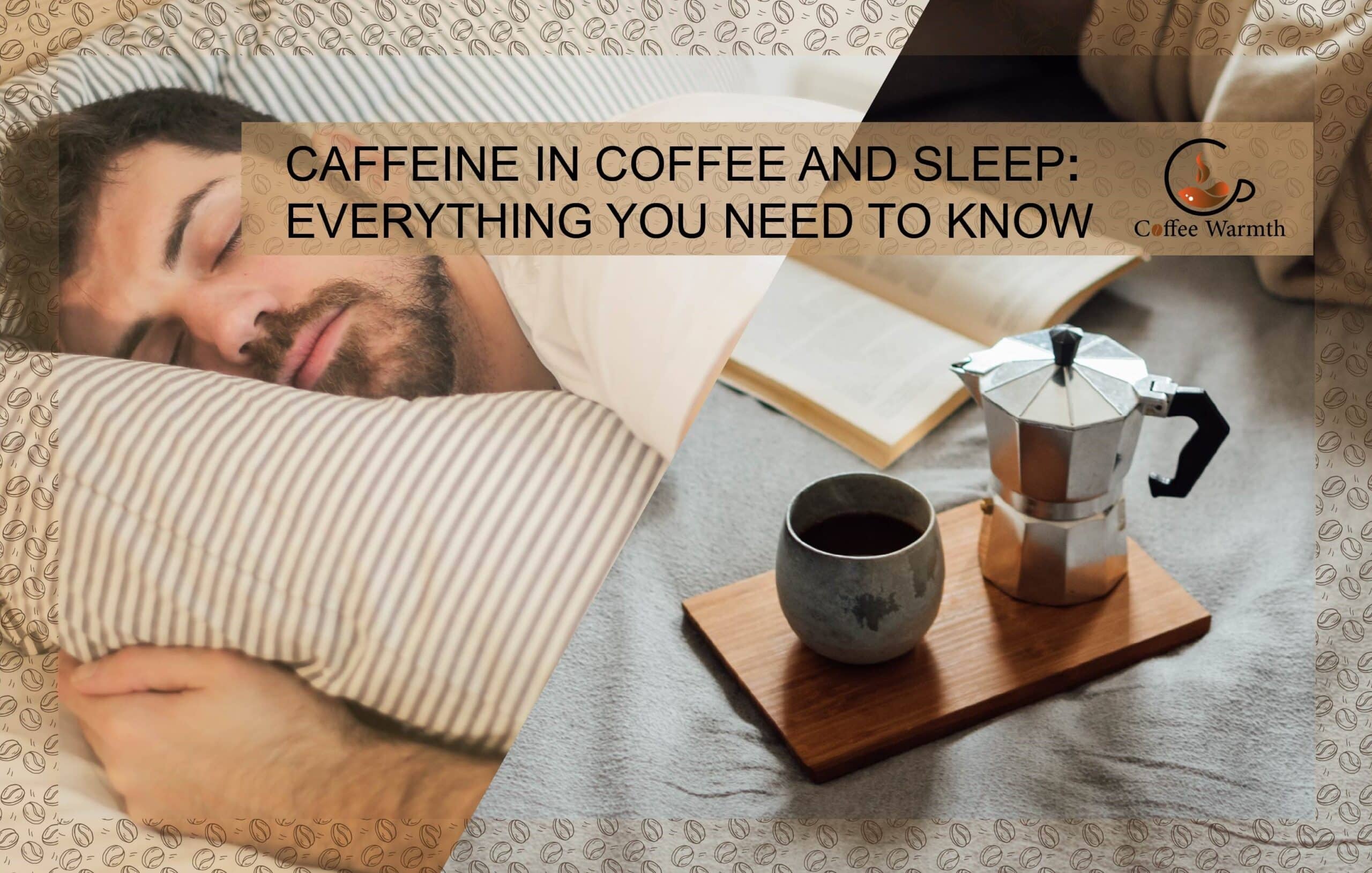Drinking coffee has a profound effect on your sleep-wake cycle and sleep quality. Caffeine present in coffee antagonizes adenosine which is a sleep causing neurotransmitter. Caffeine blocks adenosine from attaching to its receptors and increases alertness. The enhanced alertness disturbs your sleep and keeps you awake past your habitual sleeping hours. Regular sleep disturbances lead to insomnia symptoms.
Drinking even a single cup (8 fl.oz.) of coffee 6 hours before sleep is enough to displace your sleep. To prevent sleep disturbance, you should stop drinking coffee 6 hours before going to bed because it takes 5 hours on average to eliminate caffeine from your system. In case you drank a cup of coffee before bed, you’ll have to wait for the caffeine effects to wear out to sleep properly.
However, if you have an important task at hand, drinking coffee before bed can help you stay awake for a few hours but studies show that coffee at night decreases cognitive function.
How Does Caffeine in Coffee Affect Sleep?
Caffeine in coffee affects sleep by antagonizing the role of adenosine receptors which promotes sleep. Adenosine promotes sleep by attaching to adenosine receptors i.e, A1, A2A, A3, and A2B. When you drink coffee, caffeine reaches the brain within 15-60 minutes and binds to the adenosine receptors promoting wakefulness. A study published in the Journal of Clinical Sleep Medicine provides evidence that drinking coffee blocks the effects of adenosine on sleep, hence promoting wakefulness.
Coffee also produces adrenaline by activating the sympathetic nervous system. Adrenaline affects the sleep wake cycle and disturbs the circadian rhythm which decreases sleep quality, according to a study in the British Journal of Surgery. Additionally, adrenaline gives a quick rush of energy and reduces fatigue and tiredness which negatively affects sleep.
The image shows the mechanism how caffeine in coffee affects sleep.
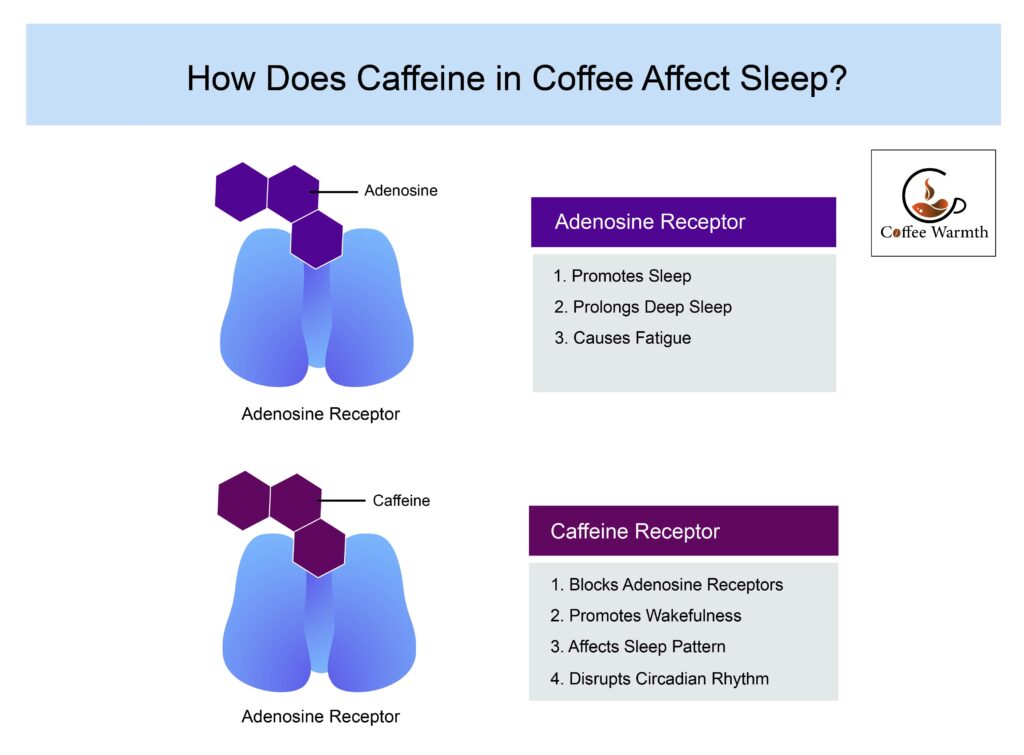
Caffeine in coffee stays in the body from anywhere between 2-10 hours but for 5 hours on average. So, a cup of coffee in the evening or night will affect your sleep as long as caffeine stays in your body.
What are the side effects of drinking coffee before bed?
The side effects of drinking coffee before bed are wakefulness, insomnia symptoms, disruption of circadian rhythm, anxiety, decreased cognitive function, and daytime sleepiness as illustrated in the figure below.
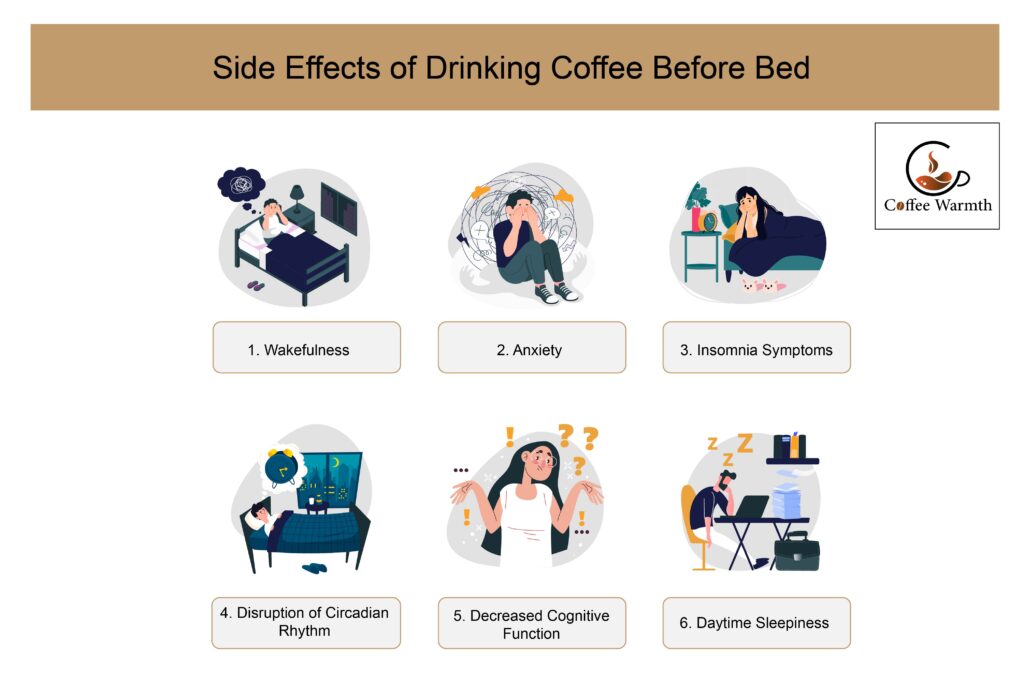
Wakefulness. Caffeine, a strong brain stimulant, causes wakefulness by restricting sleep signals from adenosine. Avram Goldstein, Professor and pharmacologist, states that drinking coffee with 150-200 mg caffeine before bed produced wakefulness in most individuals in his study.
Insomnia symptoms. Drinking coffee before bedtime shows insomnia symptoms in people diagnosed with insomnia. Nocturnal use of coffee increased sleep latency i.e., the time taken to fall asleep and reduced sleep time as reported in a study published in the Journal ‘Nutrition’. Júlia Frozi, a Psychiatrist in Porto Alegre, Brazil, reports that caffeine-induced insomnia shows symptoms of poor sleep quality and increased time to fall asleep.
Disruption of circadian rhythm. Drinking coffee before bed makes you stay awake beyond your normal sleeping time which disrupts your 24-hour circadian rhythm. A disturbance of circadian rhythm impacts sleep cycle and cognitive function directly as stated by Jan Snel PhD from Department of Psychology, University of Amsterdam.
Anxiety. A study on anxiety and sleep habits in senior adults found that 12.6% of senior adults who consumed coffee after 6 pm showed anxiety symptoms. A study in the ‘Behaviour Research and Therapy’ suggests that coffee-induced sleeplessness at night increased worrying thoughts among female students.
Decreased cognitive function. Drinking coffee before bed disrupts sleep cycle and reduces sleep time which results in decreased cognitive function. A study in the Journal ‘Risk Management and Healthcare Policy’ reports reduced cognitive control, planning capacity, creativity, and altered leadership style on the subsequent day in individuals with less sleep time.
Daytime sleepiness. Timothy Roehrs and Thomas Roth from Department of Psychiatry and Behavioral Neuroscience at Wayne State University report in their study that overnight sleep disturbance due to coffee consumption causes daytime sleepiness the next day. The US Centers for Disease Control and Prevention (CDC) found that individuals who consumed ≥240 mg caffeine/day had higher chances of daytime sleepiness.
Can caffeine cause insomnia? H3
Yes, caffeine can cause insomnia. As caffeine disrupts sleep and promotes wakefulness, regular caffeine consumption can lead to insomnia over a period of time.
Insomnia is defined as a sleep disorder characterized by difficulty falling and staying asleep. Célia LLORET-LINARES, a nutritionist at Pays de Savoie Private Hospital, states that a cup of 95 mg caffeinated coffee before bed shows insomnia symptoms like difficulty in falling asleep and increased night awakenings. According to a study “Caffeine consumption, insomnia, and sleep duration” published in Nutrition in 2016, heavy caffeine consumption before bed leads to insomnia symptoms and daytime sleepiness in the healthy population.
Another study published in the Journal of Neural Transmission found the effect of coffee consumption on insomnia in adolescents. The results showed that adolescents consuming more than 3 cups of coffee a day, where each cup contains >150mg caffeine, had 5 times more chance of developing insomnia than those consuming no coffee.
Furthermore, Michael Levy, MD, PhD, states that half life of caffeine is longer in patients with caffeine-induced insomnia.
How much coffee before bed can keep you awake?
Drinking even one cup of coffee (8 fl. oz.) containing 95 mg caffeine before bed can keep you awake at night, according to Journal of Dietitians Australia.
Consuming 400 mg caffeine equivalent to 4-5 (40-48 fl.oz.) cups of coffee 0, 3, or 6 hours before bed can keep you awake at night and prolong time to fall asleep, as mentioned in a study in the Journal of Clinical Sleep and Medicine. Dr. Ismet Karacan, specialist in psychiatry, also states drinking 4 cups (40 fl.oz.) of caffeinated coffee 30 minutes before bedtime will promote wakefulness during the night.
Thus, anywhere between 1-4 cups of drinking coffee before bed can keep you awake at night depending on each individual’s response to caffeine.
How long does drinking coffee keep you awake?
How long does drinking coffee keep you awake depends on your caffeine half life and your habitual sleep patterns.
Caffeine’s half life is highly variable from 2-10 hrs. In some individuals, caffeine is flushed out of the body within a couple of hours but in others caffeine may exert its effect for much longer.
The studies show conflicting results on how long coffee keeps you awake. Célia LLORET-LINARES reports that one cup of coffee (95 mg caffeine) 30 minutes before bed increases wake time by 17-30 minutes. Christopher L Drake, PhD and Timothy Roehrs, PhD, sleep experts, report that drinking coffee 0, 3, or 6 hrs before bed keeps you awake longer than usual by about 37-44 minutes.
The line graph shows the relationship between time taken to fall asleep and time of coffee intake before bed according to abovementioned studies.
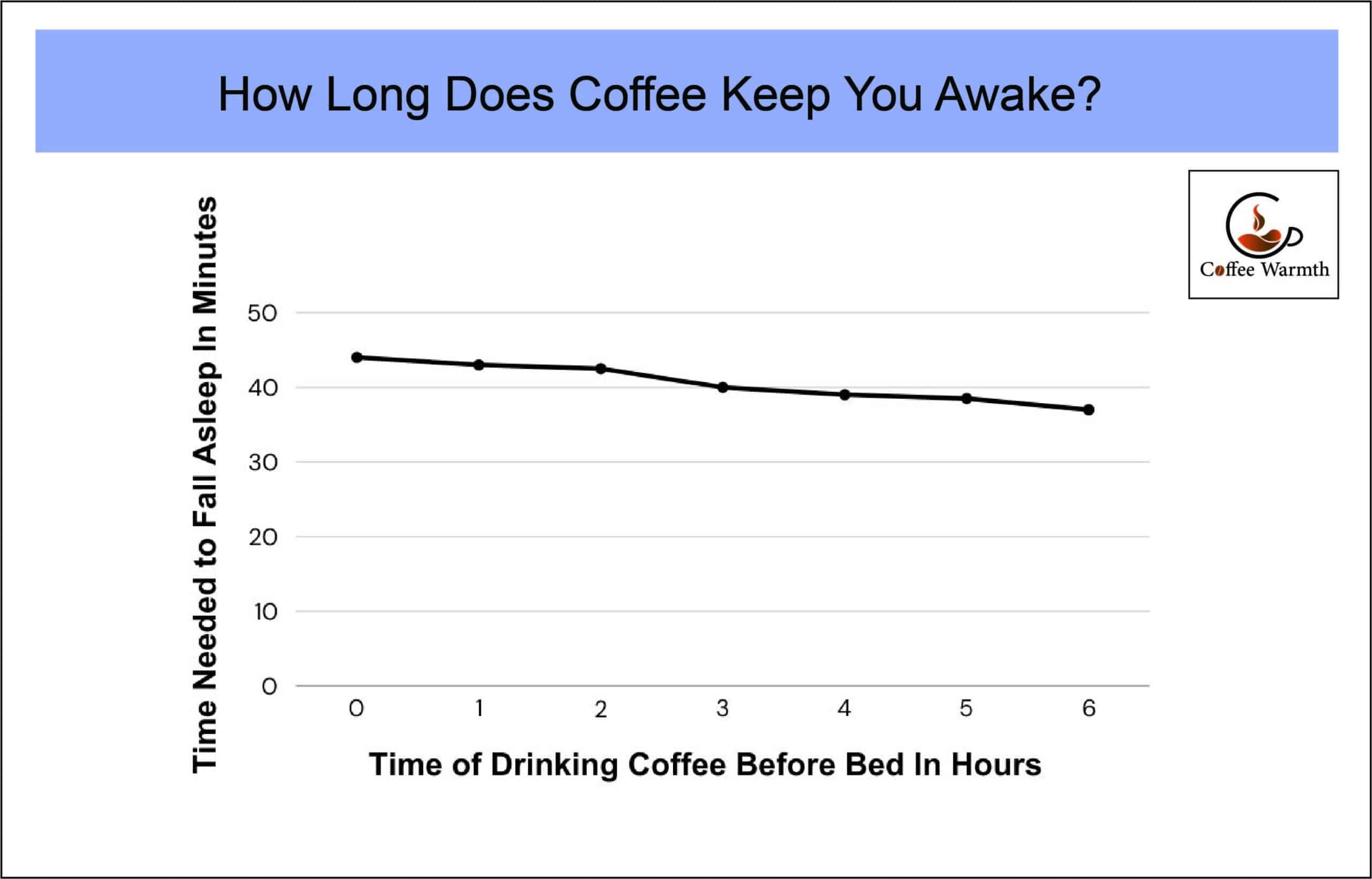
How Long Before Bed Should You Stop Drinking Coffee?
You should stop drinking coffee 6-8 hours before bed, according to Dr. Deirdre Conroy, behavioral sleep expert at University of Michigan. This time, however, is variable because people have very different sensitivities to caffeine, Dr. Conroy adds.
The ideal time to drink coffee before bed is variable and depends on the following few factors.
- Levels of adenosine
- Caffeine half life
- Tendency towards insomnia
Caffeine consumption of 400mg 0,3 and even 6 hours before bed cause sleep disturbance in hours according to a study published in Journal of Clinical Sleep Medicine.
If you are sensitive to caffeine, you should consider drinking coffee at lunch time or switch to decaffeinated coffee.
The clock shown is a general guideline when you should drink coffee in the day to avoid disruption of sleep.
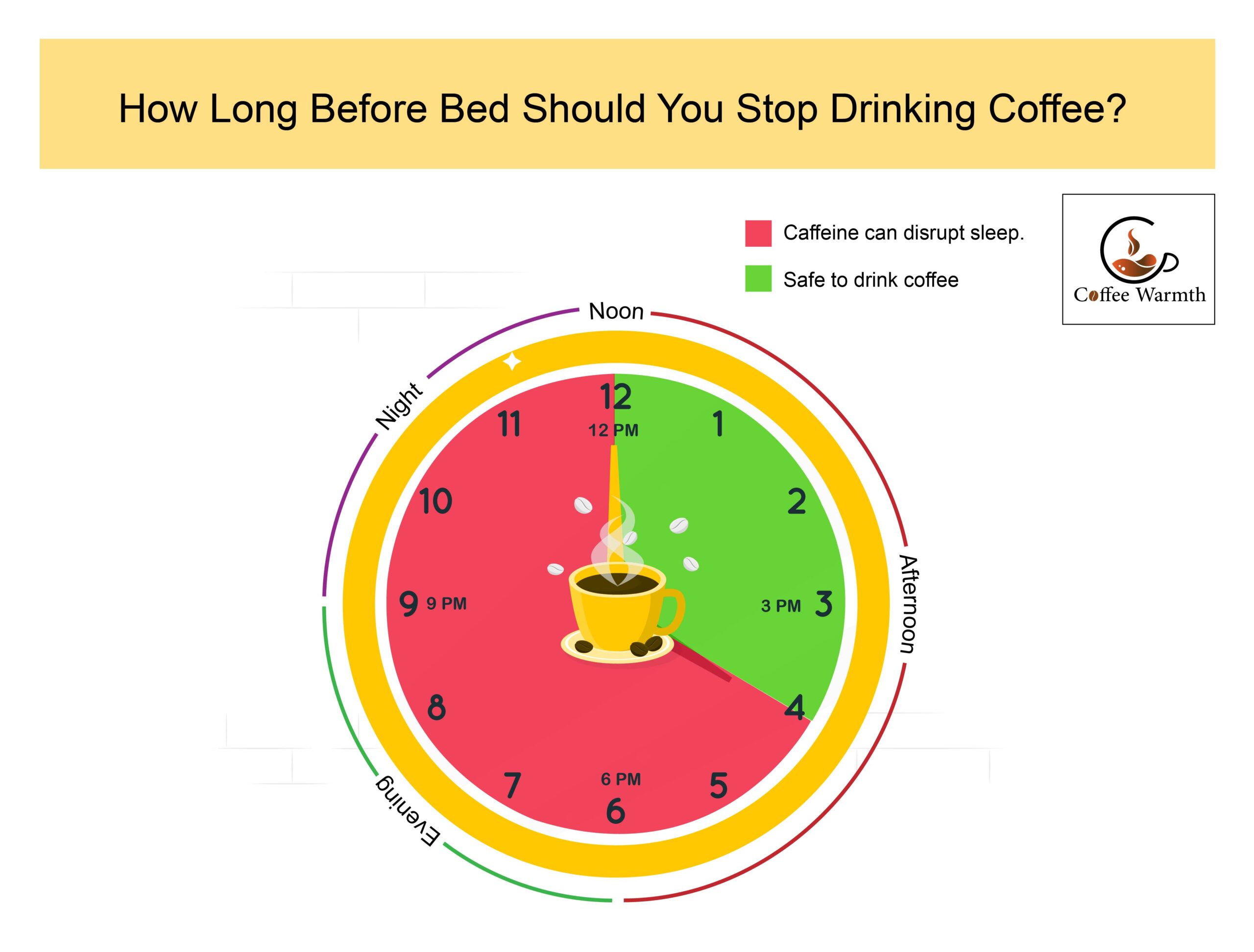
Can You Drink Decaf Coffee Before bed?
Yes, you can drink decaf coffee before bed if you experience sleep disturbances due to caffeinated coffee. Decaf coffee contains 2-15 mg caffeine which is low as compared to 95 mg of one cup (8 fl. oz.) of caffeinated coffee. Dr. Ajay Sampat, sleep medicine specialist at UC Davis Health says that most people have moderate caffeine sensitivity and decaf coffee suits them.
The individuals who drink caffeinated coffee took more time to sleep and experienced more sleep disturbances than individuals who drink decaf coffee, according to a study in the Journal Nutrition & Dietetics. Another study published in Journal ‘Sleep Medicine’ found out that the caffeinated coffee group has poorer sleep quality compared to the decaffeinated one.
If you have caffeine sensitivity, you might feel an increase in heart rate, anxiety, and nausea even after drinking decaf coffee before bed, according to the U.S. National Library of Medicine. Thus, it’s best to avoid drinking both caffeinated and decaffeinated coffee before bed.
Why does drinking coffee make some people sleepy?
Drinking coffee makes some people sleepy due to accumulation of adenosine, high caffeine tolerance, dehydration due to diuresis, and high sugar level.
The reasons why drinking coffee make some sleepy are also listed in the image below.

Accumulation of Adenosine
Caffeine in coffee blocks adenosine receptors in the brain making you feel more alert and awake. However, it does not stop your body from accumulating adenosine levels in the brain. When caffeine effects wear off, you are bombarded with the accumulated adenosine that makes you feel tired and sleepy.
Caffeine Tolerance
Regular coffee consumption can develop caffeine tolerance over time. Since caffeine blocks adenosine receptors, your body produces more receptors to counteract high caffeine molecules. The usual amount of caffeine is not enough to make you feel energetic as some adenosine receptors are free. Rather, it can make you feel more tired and sleepy. A study published in PlosOne in 2019 observed a decrease in the stimulating effect of coffee among cyclists after 15 days.
Increased Blood Sugar
Drinking coffee with sweeteners causes an instant sugar rush. When you ingest more sugar than usual, your body produces insulin as a response to offset it. Since insulin processes sugar faster, you may crash hard when the quick energy from sugar runs out. This can cause tiredness and make you feel sleepy.
Dehydration due to diuretic effect
Coffee is a diuretic which excretes more fluid from the body. Coffee dehydration decreases blood volume and delivers less oxygen to the body which may cause exhaustion, fatigue, and consequently sleep. Dietitian and Nutritionist Carlene Thomas says “Dehydration can be a definite cause of fatigue”.
Does drinking coffee in the evening keep you awake at night?
Yes, drinking coffee in the evening can keep you awake at night.
Since caffeine has a long plasma half life (5 hrs on average), coffee between 6-9 PM will stay in your system during sleeping hours. The caffeine in your system will exert its anti-sleep effects and will keep you awake beyond your habitual sleeping hours.
A study published in the Journal ‘Sleep Medicine’ investigated 6 individuals who drank a cup of decaffeinated coffee on the first day during evening hours and a cup of caffeinated coffee containing 150 mg caffeine 7 days later. The results depicted that the time to fall asleep was 15 minutes for decaf coffee, whereas the time to fall asleep for caffeinated coffee was 35 minutes. The total sleeping time also decreased by 1 hour and 20 minutes in the caffeinated group.
Are there any potential benefits of drinking coffee before bed?
Yes, there are potential benefits of drinking coffee before bed. These benefits are increase in alertness, improvement in memory, decrease in fatigue, and a better mood and listed below in the graphic shown.
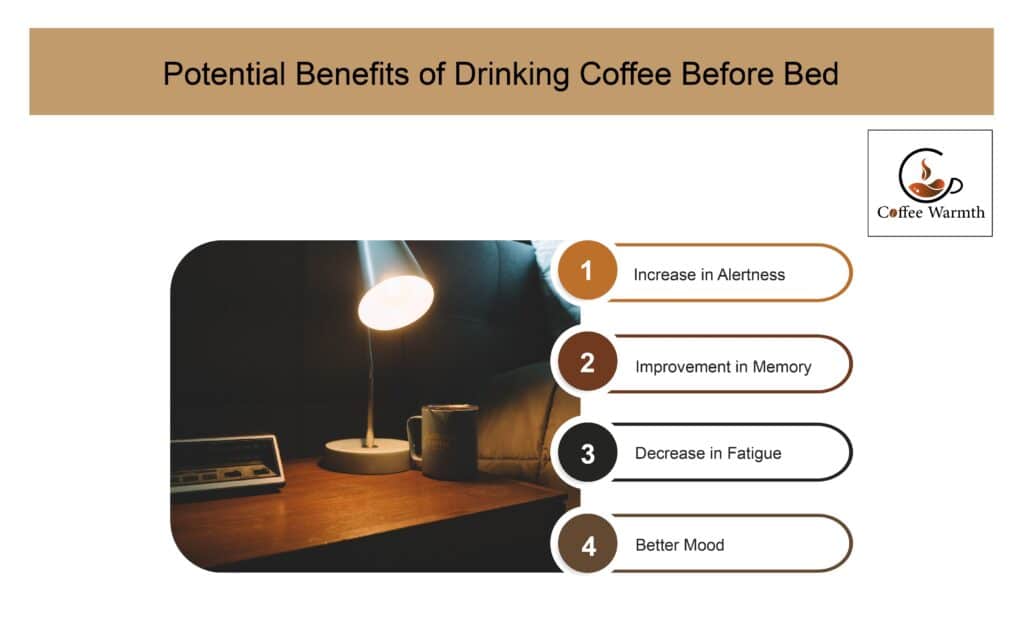
The stimulating effect of coffee before bed on the central nervous system is beneficial for late workers and students. Coffee before bedtime will keep you awake and alert at night to help you finish your important tasks. Drinking 1-4 cups (8-40 fl.oz.) of 100-400 mg have been found to exert the effect of alertness and vigilance. Andrew P Smith, from Cardiff University, states that the effect of coffee before bed on alertness and enhancement of task performance is same as that of coffee during the day.
Drinking coffee before bed can improve short term memory which is beneficial for students. Although supporting evidence is limited, a study by Rayanna Shwom and Alycia Breig from Half Hollow Hills High School East, shows that drinking coffee a night before a test increases memory performance by 6.18% in regular coffee consumers.
A cup of coffee before bed decreases fatigue by promoting general feelings of good mood and alertness. However, if you had a hectic day, coffee will disrupt your sleeping patterns leaving you more tired than before.
Although coffee before bed has been linked with anxiety, it may improve mood in some individuals due to an increase in dopamine levels. High dopamine levels make you euphoric.
How to sleep after drinking coffee?
The following are some ways to sleep after drinking coffee.
- Reduce the lights from your room. Melatonin, the sleep hormone, is produced during darkness and is inhibited in light.
- Read a book to activate the eye visual processing system. Rapid eye movements and brain processing makes your eyes and brain tired which will help induce sleep.
- Maintain optimal temperature in the room. A hot or cold environment will make you uncomfortable and interfere with your sleep.
- Do some exercise to help metabolize caffeine quicker than usual.
- Stay hydrated as coffee is a diuretic. Water aids in many body functions including temperature regulation which helps you sleep better.
- Avoid using your mobile phone as it suppresses the production of melatonin.
- Have some background white noise to cancel out other high-pitched noises.
These steps to sleep after drinking coffee are also listed in the figure below.
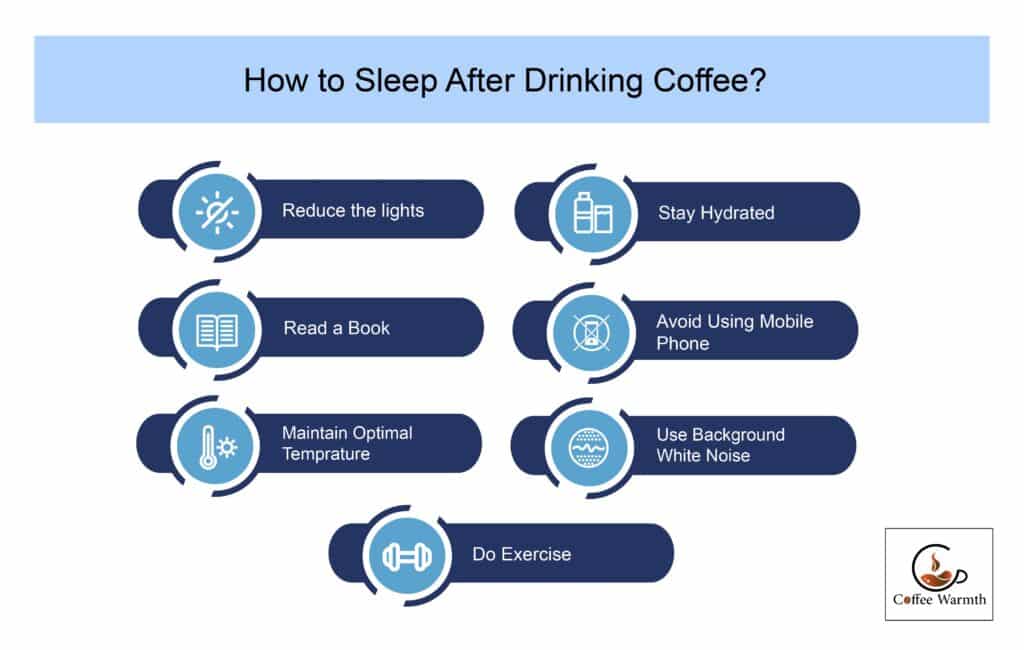
How to flush caffeine out of your system to sleep?
You can flush caffeine out of your system to sleep by exercising, drinking water, and waiting. Exercise or any movement metabolizes the plasma caffeine, uses it quickly, and decreases its level. Drinking water keeps you hydrated which protects against diuretic nature of caffeine and helps sleep tighter. The last way to flush caffeine out of your system is to wait for it to be fully metabolized.
